On Thursday, Libya’s Parliament-designated Prime Minister, Osama Hammad strongly condemned the militia threats and extortion targeting the National Oil Corporation (NOC) and its affiliated companies in Tripoli.
He warned that armed groups are interfering with Libya’s vital oil sector, putting the country’s economic stability at serious risk.
In a statement, Hammad accused these groups of carrying out illegal intimidation and blackmail against key oil companies, including Akakus Oil Operations, Waha Oil Company, Mabrouk Oil Operations, and Harouge Oil Operations.
He described these actions as direct attacks on Libya’s national wealth and vowed that his government would take all necessary legal measures to protect the industry.
Calling for immediate international intervention, Hammad urged the United Nations Support Mission in Libya (UNSMIL) and the UN Secretary-General’s representative to step in and prevent further militia interference. He stressed that ensuring the independence and security of Libya’s oil industry is essential for national stability.
Libya’s oil sector remains the backbone of its economy, accounting for over 90% of state revenues. However, it has been plagued by political conflicts, armed group control, and repeated blockades. The battle for control over oil production and revenues has long fueled tensions between the Tripoli-based Government of National Unity (GNU) and the eastern-based administration.
Hammad’s statement signals a new escalation in Libya’s struggle over oil control, with his government making it clear that it will not allow armed groups to dictate the future of the industry. The crisis highlights the urgent need for security reforms and stronger international oversight to prevent Libya’s oil wealth from being manipulated by militias and political factions.
Libya’s oil sector is critical to funding public services, infrastructure projects, and salaries for government employees. Any disruptions in production or exports directly impact the national budget and economic stability.
With foreign investment hesitant due to security risks, Libya’s energy future depends on securing its oil fields and refineries from militia control. International companies, particularly from Italy, France, and China, have expressed concerns about the security of their operations in Libya, further complicating the country’s ability to attract foreign partnerships.


